 Norway - Full Moon 172 - 09/23/10
Norway - Full Moon 172 - 09/23/10
It's a label showdown!
Metronomicon Audio vs. Jester Records - Round 15
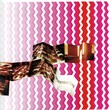
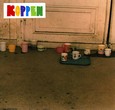 Koppen: Truckdriving Songs
Koppen: Truckdriving Songs
(2003 Metronomicon Audio: MEAU.0015.CDR)
vs.
Rotoscope: Great Curves
(2001 Jester Records TRICK-015)
Welcome to round 15 in the label showdown series between Metronomicon Audio and Jester Records!
Since we've more or less totally missed out on reviewing the output of these two great labels, we are going
through their entire catalogues, matching the releases from each label consecutively against each other.
Humorously counting goals and giving out yellow
and giving out yellow and red
and red cards, soccer style -
but first of all reviewing the music. For more introductory information on this label match, see
round 1. cards, soccer style -
but first of all reviewing the music. For more introductory information on this label match, see
round 1.
Match preview
Truckdriving Songs is presented in the typical Metronomicon fashion - a CD-R packed in a flexible plastic
sleeve with a cardboard folder and folded insert containing art & information.
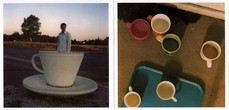
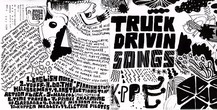
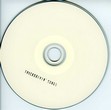

The Rotoscope release comes in a jewel case and an insert with art and info.
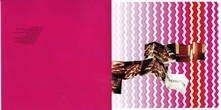
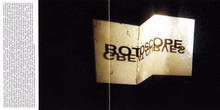
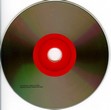

The match
Täppas Strepens younger brother Koppen is a new acquaintance from the Metronomican family. He may have contributed to earlier
releases, but this is the first one bearing his name. Joining him in the studio is (of course) Sissyfus,
but the lyrics and songs are all Koppen's own. Well, the first two tracks are not songs in the
traditional sense, but soundbit cut-ups mashed together, serving more as an intruduction to the album.
"English Noise" is short and somewhat funny, while "Vofff" is an annoying listen .
The instrumental "Do The Finnish Stupid Harassement" also uses samples and sounds synthetic, but at
least it builds up to the first proper song of the album, "Instructions To An Action Flick, which
sounds a little like Beck singing, but to a Casio-like arrangement that we know from other Metronomicon
releases. The song glides almost unnoticably into the next almost similar "Hadacol". This duo of songs
are almost hummable, but the arrangements work partly against them in this regard. "Time Travel" is just a short
interlude, leading into "Prince Charming Of Garbage", which is a rather bland experience. Here the
arrangements are playful in a more attractive way, but its guitar-strumming base is not very imaginative.
Hip-hop rhythms creates a backdrop for another tedious listning experience with samples in "Dance Mission No. 9" .
The instrumental "Do The Finnish Stupid Harassement" also uses samples and sounds synthetic, but at
least it builds up to the first proper song of the album, "Instructions To An Action Flick, which
sounds a little like Beck singing, but to a Casio-like arrangement that we know from other Metronomicon
releases. The song glides almost unnoticably into the next almost similar "Hadacol". This duo of songs
are almost hummable, but the arrangements work partly against them in this regard. "Time Travel" is just a short
interlude, leading into "Prince Charming Of Garbage", which is a rather bland experience. Here the
arrangements are playful in a more attractive way, but its guitar-strumming base is not very imaginative.
Hip-hop rhythms creates a backdrop for another tedious listning experience with samples in "Dance Mission No. 9" ,
while "Juego En Cirque" goes plastic circus waltzing ,
while "Juego En Cirque" goes plastic circus waltzing . As if that wasn't enough,
enter "Koppen Medley", which revisits the previous songs, adding helium . As if that wasn't enough,
enter "Koppen Medley", which revisits the previous songs, adding helium . Luckily, "Electric Pilotes" slows down
the album and its simple but mood-setting electric bass, and what sounds like an array of various string instruments, creates
a darker, almost psychotic feeling, saving the day . Luckily, "Electric Pilotes" slows down
the album and its simple but mood-setting electric bass, and what sounds like an array of various string instruments, creates
a darker, almost psychotic feeling, saving the day . .
To sum it up: Sadly, Koppen's debut album is rather disappointing.
He's not a great singer, but that's not the biggest problem here, I just don't hear enough
song-writing creativity to justify a whole album. I may be missing the point at some level, but the melodies
and song structures here are all too similar, while the arrangments vary from the tolerable to the annoying, especially this goes for
the parts of the album that are between songs, which at times feels like being pinballed inside a video game .
Reportedly, "a ridiculous amount of coffee was consumed before recording and writing this album".
I am not surprised, but I'm sure Koppen will come back with something more substantial next time, coffee or no coffee. .
Reportedly, "a ridiculous amount of coffee was consumed before recording and writing this album".
I am not surprised, but I'm sure Koppen will come back with something more substantial next time, coffee or no coffee.
If parts of Koppen were hard to enjoy, Rotoscope's Great Curves confronts the listener right from the start with
the ideally named "Press Stop", which is one minute of noisy glitch . Luckily things slow down with "All That You Owned (Remix)",
with a female voice singing seemingly unconnected to the accompanying piano, both recorded like squeezed through a
thin electric chord, small noises tear up the recording and fragments become distorted, sounding more ethereal than nightmarish.
"The Bogota Sub" starts out with more industrial electronic cut-ups, developing into a fast break-beat,
adding an array of samples, quite hectic until it abruptly halts into a subdued theme with simple melodies by mellow electronic sounds.
This glides on into "Cooks Whip, Music Goes On", which introduces Lars Horstveth (Jaga Jazzist) on saxophone playing a slow jazzy theme to a
straight arrangement (drums, acoustic bass, keyboards), only occasionally spiced with electronic tweaks and spacey sounds.
But with "Pink Soda" it's back to the fragmentation and distortion, the song structure and the female voice are barely recognizable, like
hearing the song fragmented through broken radios, digital and analogue transmissions that don't quite get through. Halfway through
the song the radio gives in, and we're left with the saxophone repeating a simple theme, over a carpet of modest loops and samples.
"Watercooler" has a more noisy floor, but is not very intruding. This time the piano plays the leading part, playing a moody but fragmented
melody. "Noiserok Orkesterissa" is not that much more noisy, but faster, driven by rapid drums and percussion, and is another straigther
jazz piece, with a vibraphone improvising rather freely, among other instruments. Electronics and effects are used only as colouring here,
and prehaps treating the bass, otherwise this goes in the direction of free jazz, until a theme appears towards the end, slowing things down.
Quite entertaining . Luckily things slow down with "All That You Owned (Remix)",
with a female voice singing seemingly unconnected to the accompanying piano, both recorded like squeezed through a
thin electric chord, small noises tear up the recording and fragments become distorted, sounding more ethereal than nightmarish.
"The Bogota Sub" starts out with more industrial electronic cut-ups, developing into a fast break-beat,
adding an array of samples, quite hectic until it abruptly halts into a subdued theme with simple melodies by mellow electronic sounds.
This glides on into "Cooks Whip, Music Goes On", which introduces Lars Horstveth (Jaga Jazzist) on saxophone playing a slow jazzy theme to a
straight arrangement (drums, acoustic bass, keyboards), only occasionally spiced with electronic tweaks and spacey sounds.
But with "Pink Soda" it's back to the fragmentation and distortion, the song structure and the female voice are barely recognizable, like
hearing the song fragmented through broken radios, digital and analogue transmissions that don't quite get through. Halfway through
the song the radio gives in, and we're left with the saxophone repeating a simple theme, over a carpet of modest loops and samples.
"Watercooler" has a more noisy floor, but is not very intruding. This time the piano plays the leading part, playing a moody but fragmented
melody. "Noiserok Orkesterissa" is not that much more noisy, but faster, driven by rapid drums and percussion, and is another straigther
jazz piece, with a vibraphone improvising rather freely, among other instruments. Electronics and effects are used only as colouring here,
and prehaps treating the bass, otherwise this goes in the direction of free jazz, until a theme appears towards the end, slowing things down.
Quite entertaining ! "Carpet illusions" is another one with female vocals, again the recorded voice sounds like from a deteriorated tape, while
the accompanying keyboard comes clearer through. It's a nice little song, that probaby would have been just as good without the additional small noises
and the distortion, but these are essential part of the Rotoscope formula it seems. "Divide and Dissolve" starts with what sounds like
slowly sinking and rising sinus tones, fast but sparse break-beats join in, upon which vibraphone and guitars or/and other instruments
lay free-jazzy like solos and melody/chord figures, all while the intensity increases. The almost 10 minute long "Traveller" ends the album.
It again features a treated female vocal, arrangement-wise similar to other songs here, the voice is joined by a keyboard and some
light noise. The song then develops into an almost acoustic saxophone (and clarinet?) ensemble, repeating a quite relaxing theme.
Fading away, we're left with a soft electronic space buzz that also slowly disappears. ! "Carpet illusions" is another one with female vocals, again the recorded voice sounds like from a deteriorated tape, while
the accompanying keyboard comes clearer through. It's a nice little song, that probaby would have been just as good without the additional small noises
and the distortion, but these are essential part of the Rotoscope formula it seems. "Divide and Dissolve" starts with what sounds like
slowly sinking and rising sinus tones, fast but sparse break-beats join in, upon which vibraphone and guitars or/and other instruments
lay free-jazzy like solos and melody/chord figures, all while the intensity increases. The almost 10 minute long "Traveller" ends the album.
It again features a treated female vocal, arrangement-wise similar to other songs here, the voice is joined by a keyboard and some
light noise. The song then develops into an almost acoustic saxophone (and clarinet?) ensemble, repeating a quite relaxing theme.
Fading away, we're left with a soft electronic space buzz that also slowly disappears.
To sum it up: Experimental glitchy jazz, light melancholy, semi-noisy, and softly distorted. I find Rotoscope's inclination to use this mild distortion on
or with almost every natural instrument somewhat forced and unimaginative ,
especially this goes for the always processed female vocals. At its core, Great curves depicts Rotoscope as a rather straight jazz band taking the
occasional free jazz detour, and their use of experimental, noisy electronics and distortion sometimes feels like they are adding oil to water.
However, the album is not bad, I just find it somewhat unengaging. ,
especially this goes for the always processed female vocals. At its core, Great curves depicts Rotoscope as a rather straight jazz band taking the
occasional free jazz detour, and their use of experimental, noisy electronics and distortion sometimes feels like they are adding oil to water.
However, the album is not bad, I just find it somewhat unengaging.
Match result: Metronomicon Audio 1 (      ) - Jester Records 1 ( ) - Jester Records 1 (   ) )
Next match
Next head-to-head meeting is the Täppas Strepens EP Dance, Dance Decadance from Metronomicon Audio which is up against the
Ulver release Silencing the Singing from Jester Records.
Copyright © 2010 Knut Tore Breivik 
|

 Koppen: Truckdriving Songs
Koppen: Truckdriving Songs




